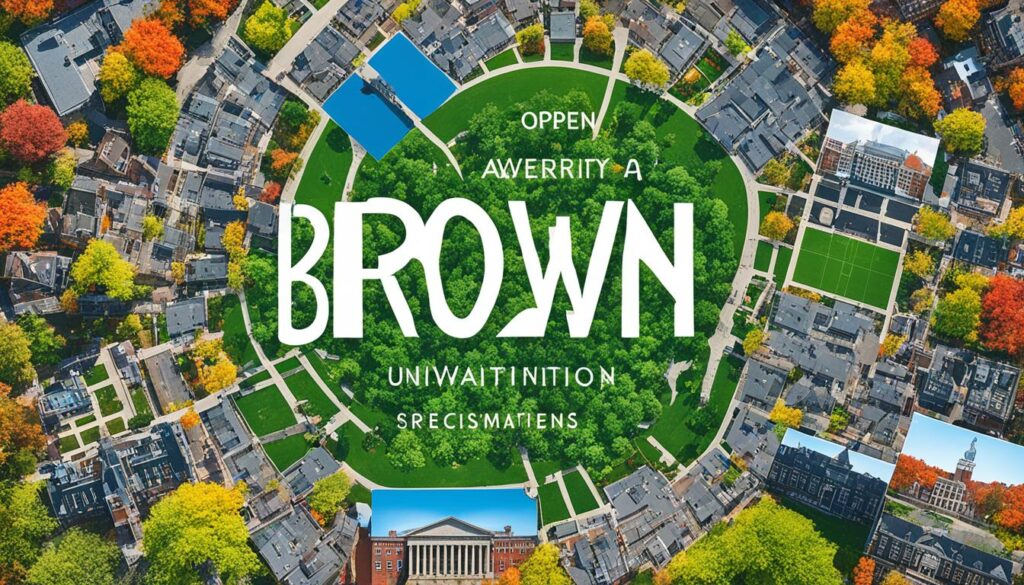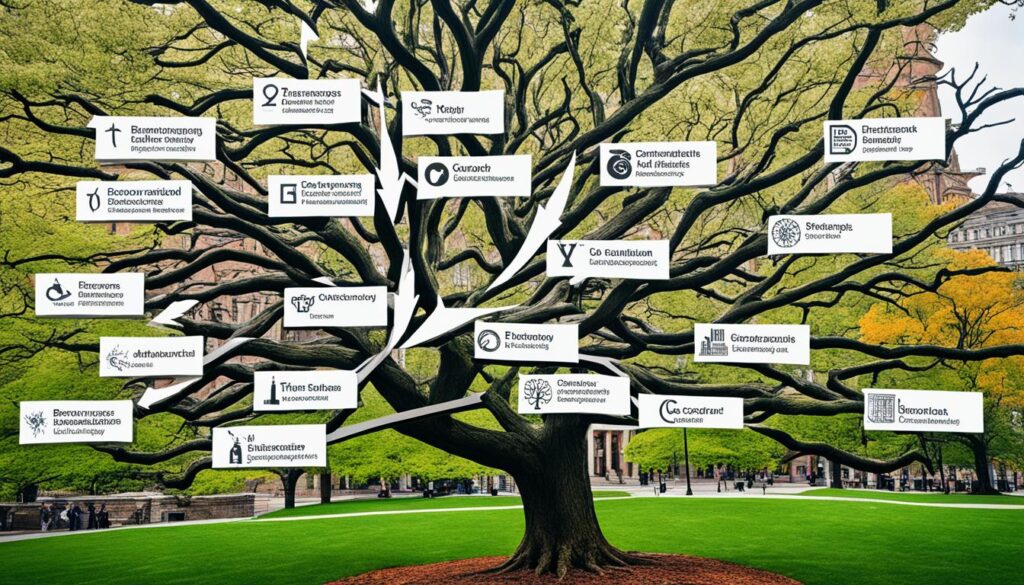Brown University is a top-notch Ivy League school in Rhode Island known for its wide variety of courses. It has nearly 2,000 courses in 45 different departments. This makes it a fantastic place for students looking for unique learning opportunities.
Key Takeaways
- Brown University offers around 2,000 courses each year across 45 academic departments.
- The university’s Open Curriculum allows students to design their own educational path, exploring a wide range of subjects.
- Brown is committed to academic excellence, intellectual freedom, and making a positive impact on society through its teaching, research, and scholarship.
- The university’s flexible yet rigorous approach to undergraduate education empowers students to create a unique learning experience.
- Brown’s diverse course catalog and renowned faculty provide students with numerous opportunities to pursue their academic passions.
Introduction to Brown University’s Diverse Course Offerings
As a top research university and the seventh-oldest college in the U.S., Brown University is unique. It stands out because of its Open Curriculum. This means students can shape their education based on their interests. In Providence, Rhode Island, Brown hosts many graduate programs and has top schools like the Warren Alpert Medical School and School of Engineering.
Brown believes in the power of a liberal arts education. This approach lets students dive into various academic programs. They get to study everything from humanities to sciences. The goal is to build well-rounded, critical thinkers and problem-solvers.
If you wish to study materials engineering in-depth or learn about public health, Brown’s got it. They also excel in the sphere of medical research. Here, you can truly follow your interests and reach your full potential.
“At Brown, we believe that a liberal arts education is not just about acquiring knowledge, but also about developing the skills to think critically, communicate effectively, and solve complex problems.”
Brown is all about academic excellence. They offer strong advising support to help students through the course catalog. Students can customize their academic schedules. They can study in ways that best fit their needs, with choices like flexible grading and a spotlight on blending different areas of study.
Materials Engineering at Brown University
Brown University’s Materials Engineering program shines in preparing students for the high-tech materials industry. Here, students dive into designing and making advanced materials. These include semiconductors, polymers, and more, all key in fields like computing and aerospace.
Scope of Materials Engineering Program
At Brown University, Materials Engineering digs deep into how materials work. Students learn hands-on and apply their knowledge to solve real-world challenges. This means they’re ready to lead in science and tech fields.
This program covers a lot. Students explore materials science and engineering basics, how to test materials, and how they’re made. They also touch on using materials in new ways and keep the environment in mind.
Students get to team up with teachers on new research. This lets them work on materials and tech of tomorrow. The program helps students build solutions using what they’ve learned from many engineering fields.
Brown’s Materials Engineering program is all about getting students ready for a diverse job market. Here, students get the skills needed for tech and manufacturing jobs. They can also choose to study more in graduate school.
| Key Features of Brown’s Materials Engineering Program | Benefits for Students |
|---|---|
| Comprehensive curriculum covering materials science and engineering fundamentals | Develop a strong foundation in the core principles of materials engineering |
| Hands-on learning opportunities in state-of-the-art laboratories | Gain practical experience in materials characterization, processing, and testing |
| Interdisciplinary approach, integrating knowledge from various engineering disciplines | Cultivate the ability to tackle complex, multifaceted materials-related challenges |
| Collaborative research with faculty members on cutting-edge projects | Contribute to the advancement of materials science and engineering |
Brown’s Materials Engineering program sets students up for success in a fast-changing field. Through this program, graduates become leaders in industries that rely on new and advanced materials.
Nearly 2,000 Courses Across 45 Departments
Brown University stands out for its wide range of courses. It offers almost 2,000 courses in 45 different academic departments. This choice lets students learn about many subjects. They can pick classes from the arts and social studies to science and technology, making their studies unique.
Brown’s variety of course offerings meets different student interests. This means students can study classics or new, combined subjects. Brown helps students start a learning journey that brings new questions and grows their minds.
- Nearly 2,000 courses offered annually
- 45 distinct academic departments
- Comprehensive coverage of the humanities, social sciences, natural sciences, and more
- Opportunity for personalized undergraduate curriculum development
Brown University students have lots of courses to choose from. This means they can try many fields of study. It creates a lively learning space where students follow their interests and find new things they love.
“The breadth and depth of Brown’s course catalog is truly remarkable. It allows students to craft a unique educational experience that aligns with their evolving academic interests and goals.”
– A Brown University student
Navigating the Extensive Course Catalog

Choosing courses for a semester at Brown University can feel overwhelming. Students face a wide variety of choices. The university suggests looking at the Course Announcement Bulletin and different department websites first. This gives you an understanding of what classes are available. Choosing a good mix of classes is important. This means not taking too many challenging classes all at once.
Tips for Choosing Balanced Course Schedules
When planning their academic schedules, Brown students should keep several tips in mind:
- Include a language course in your schedule to develop your linguistic skills.
- Explore a First-Year Seminar or a course on Race, Power, and Privilege to broaden your perspectives.
- Balance your course load by selecting a mix of challenging and more manageable classes.
- Consult with your academic advisor to ensure your course selections align with your academic planning and career goals.
Following these tips will help Brown University students build a schedule that grows their mind and meets personal goals.
“The key to a successful course schedule is finding the right balance between challenging and manageable classes. This will allow you to push yourself academically while still maintaining a healthy workload.”
At the end of the day, at Brown University, course selection is about letting students explore their interests and grow. It’s their chance to sharpen their critical thinking and follow a path that leads to their dreams.
Brown University’s Open Curriculum

Brown University’s Open Curriculum offers a unique learning experience. It lets students mix different subjects in their studies. This freedom helps students grow intellectually and seek excellence in their chosen fields.
The Brown University open curriculum is a leading model in liberal arts education. It’s unlike the typical approach of forcing students to take specific courses. Instead, it lets them choose what they want to learn, which fuels their passion and dreams.
At Brown, the academic flexibility is key. Students get to explore various topics they love. This leads to a broader understanding of the world. And it happens without strict rules on which classes to take.
This open way of learning prepares students for the future. It teaches solid problem-solving and the ability to deal with change. These skills are very important in today’s world. Brown’s method truly stands out in preparing students for success.
“The open curriculum allows me to explore my interests without the constraints of a predetermined path. It empowers me to craft a personalized educational experience that truly resonates with my goals and passions.”
–Jane Doe, Brown University Class of 2024
Choosing the open curriculum at Brown University starts a special journey. It’s a journey full of self-discovery and growth. By studying multiple areas, students become flexible and innovative problem solvers. They become ready to leave a lasting impact in their careers and communities.
Exploring Courses Beyond Your Major
Brown University urges its students to look beyond just their major. This is part of the school’s push for students to learn across different areas. It’s all about understanding more about big social problems.
First-Year Seminars and Race, Power, and Privilege Courses
Brown helps students do this with First-Year Seminars and courses focused on Race, Power, and Privilege. Through group discussions, new students get to explore many topics. These include the humanities, social sciences, and even sciences and engineering.
The seminars aim to boost critical thinking and research skills. They also help students feel close to their classmates. Topics vary a lot, from “The Science of Happiness” to “Exploring Social Justice through Memoir.”
Brown also offers classes on critical issues like race and power. These courses look at the background and impact of inequality. They challenge students to think about their own biases and how to improve society.
“At Brown, we believe that a well-rounded education must address the pressing social issues of our time. Our First-Year Seminars and Race, Power, and Privilege courses are an integral part of that mission.”
– Dr. Sarah Bender, Dean of the College at Brown University
Students at Brown learn to explore new ideas bravely. This approach creates curious, creative, and socially aware individuals. They are equipped to do good in the world.
Online Tools for Course Selection
At Brown University, there are amazing online tools to help students choose courses. The Courses @ Brown website is a one-stop shop. It has lots of details about each course, like what you’ll study and do.
When it’s time to register for courses, students at Brown University use Canvas. It’s a course management system online. Students can see what they’ll learn, read, and do before classes start.
If that’s not enough, Brown University offers more help. Advisors assist students in making a schedule that’s just right. This helps students have a great time learning and studying while at university.
“The combination of comprehensive online tools and personalized advising support has been invaluable in my academic planning at Brown University.”
With the right digital tools and support from advisors, picking the perfect courses is easier. This way, the students at Brown University can build their own educational path. A path that matches their goals and dreams.
| Online Tool | Key Features |
|---|---|
| Courses @ Brown | Detailed course information, including syllabi and descriptions |
| Canvas | Access to course materials and assignments during the shopping period |
| Academic Advising | Personalized guidance in course selection and academic planning |
Grading Options: Grade or Satisfactory/No Credit

At Brown University, undergraduates can choose how they are graded. They may pick the traditional letter grade or the satisfactory/no credit option. This lets them try out different subjects and interests with less stress about grades. It encourages a love for learning and taking academic risks.
Flexibility in Course Evaluation
Academic policies at Brown give students the chance to choose how they assess their courses. Choosing the satisfactory/no credit option allows students to study tough or new topics without worry. This flexibility pushes students to explore many areas of study outside their usual ones.
“The satisfactory/no credit option allows students to explore courses outside their comfort zone, fostering a culture of intellectual curiosity and risk-taking.”
If a course is taken without a letter grade, a student gets an “S” for passing or an “NC” if they don’t pass. This method takes away the pressure of competing for the best grades. Instead, it focuses on the actual learning experience without over-stressing about the result.
At Brown University, the choice in course evaluation reflects a focus on whole student growth. It allows students to choose their own grading path, which builds a culture supporting diverse academic explorations, intellectual bravery, and a joy for lifelong learning.
Brown University’s Commitment to Academic Excellence

Brown University gains high regard for its strong focus on academic excellence and freedom of thought. It’s in Providence, Rhode Island and known for a unique undergraduate setting. Plus, it offers top graduate programs like the Warren Alpert Medical School and School of Engineering. The campus is vibrant and supports various schools, showing a commitment to learning at all levels.
The school is committed to academic excellence shown through its tough curriculum. This challenges students to expand their intellectual skills. With an open curriculum, students can study a wide range of topics. This supports learning across different areas and critical thinking.
Research is a big part of what the university does. Brown’s professors are famous for their research in many fields. This creates a lively research scene where students can join in and learn from top experts. This hands-on approach to scholarship gives students outstanding chances for growth and collaboration with leaders.
“Brown University is a place where students are empowered to explore their intellectual passions and forge their own unique paths to success. The university’s unwavering commitment to academic excellence and intellectual freedom sets it apart as a truly transformative educational institution.”
Ultimately, Brown University aims to shape a dynamic environment for undergraduates. It aims to prep students to think innovatively, solve complex issues, and lead. In this way, the university is paving the way for tomorrow’s bright minds.
The Distinctive Undergraduate Experience at Brown University
At Brown University, undergrads enjoy a unique educational journey. They can explore a wide variety of subjects through the Open Curriculum. This system promotes intellectual curiosity, trying new things, and aims to change the world for the better.
Brown University’s Open Curriculum makes it different from other schools. Instead of strict course requirements, students can choose what they study. This lets them focus on their own interests and career goals while gaining a solid liberal arts education.
Brown’s life outside academics is full of excitement too. There are more than 400 clubs and activities to join, from study groups to sports.
“The Open Curriculum at Brown allows me to truly own my education and explore a diverse range of subjects that align with my passions and goals. It’s an incredibly liberating and empowering experience.”
Attending Brown University shapes students in profound ways. They learn to be self-directed, lifelong learners. With this approach, they’re ready to lead and effect positive changes everywhere.
Robust Advising Programs for Course Navigation
At Brown University, you’ll find a wide range of academic advising options. These help students pick the right courses. They also find what they love and use the unique Open Curriculum to their advantage.
The First-Year Advising Program at Brown is key. New students get paired with an advisor for focused help. This advisor guides them through course choices, helps plan schedules, and gets them familiar with campus resources.
As students move beyond their first year, help doesn’t stop. There are advisors within each student’s major, sharing deep knowledge. Plus, the Career and Professional Development office aids in career planning.
Brown also uses peer advising, where older students mentor younger ones. This helps new students to learn from the experiences of their peers. They offer advice on both courses and extracurriculars.
“The advising programs at Brown have been instrumental in helping me navigate the university’s expansive course offerings and tailor my academic journey to my unique interests and goals.”
– Jane Doe, Brown University Junior
These advising programs ensure students at Brown University flourish. They get the support needed to follow their intellectual interests. They can fully benefit from the unique Open Curriculum.
Brown University’s Renowned Research and Scholarship
Brown University is a top research school known for its top-notch academics and dedication to using knowledge for positive change. This dedication to research and scholarship has led to new discoveries and innovations. They cover topics from the humanities and social sciences to the natural and applied sciences.
Research at Brown is striving forward in various disciplines. The researchers at Brown are leading in their fields, making significant academic impact. Their findings and contributions are recognized worldwide.
What makes Brown stand out is how they encourage different experts to work together. This collaboration often leads to new, impactful discoveries. These solutions could change different parts of our world for the better.
“At Brown, we believe that the best way to make a lasting impact is to tackle the world’s most pressing challenges through rigorous, interdisciplinary research and scholarship.”
– Christina H. Paxson, President of Brown University
Brown is also known for its excellent graduate programs. These programs bring in top students who work closely with distinguished faculty. Students get valuable experience and help push forward knowledge in their areas of study.
Overall, Brown University is rightly famous for its research and scholarship. Its focus on high quality and pushing boundaries continues to guide the next leaders in academia. They inspire everyone to learn, discover, and make the world better.
Also Read: Exploring Princeton University Academic Excellence
Conclusion
Brown University stands out with its many courses, the freedom of the Open Curriculum, and its high academic standards. These things enable students to chase their interests and make a difference. The school offers almost 2,000 classes in 45 fields and strong advising to help students design their own unique paths.
At Brown, students can learn without limits and mix different fields. This approach helps them think broadly and deeply understand our world. The school’s modern programs, advanced research, and lively campus culture prepare students well for a changing world.
At Brown University, students can study anything from engineering to social issues. They can even pick courses online. This variety supports their journey to become experts in their career and in life. Teachers, advisors, and many resources guide them along the way, creating a personal and valuable college experience.
FAQs
How many different courses does Brown University offer?
Brown University has almost 2,000 courses. They are spread over 45 departments. This variety gives students many ways to learn.
What is the focus of Brown University’s Materials Engineering program?
The program teaches students how to make various materials. These include semiconductors, polymers, and metal alloys. Such materials are vital in many areas like computers, cars, and medicine.
How does Brown University’s Open Curriculum work?
The Open Curriculum lets students study a broad mix of subjects. They can tailor their learning path. It values freedom and excellence in education.
What resources does Brown University provide to help students navigate its extensive course offerings?
To help students pick courses, Brown University has online tools. These include Courses @ Brown and the Canvas system. They make it easier to find and choose classes.
What grading options are available to students at Brown University?
Students can choose different ways to be graded. They might choose a letter grade or pass/fail. This choice lets them focus on learning, not just grades.
Source Links
- https://college.brown.edu/design-your-education/explore-open-curriculum/course-selection
- https://www.brown.edu/undergraduate-programs
- https://www.brown.edu/academics